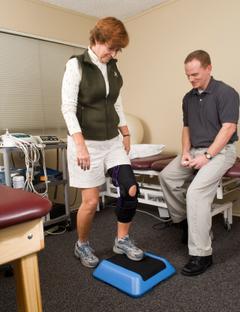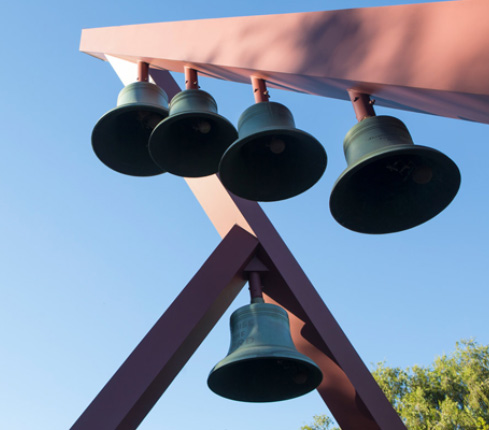Occupational Therapist
Biola offers an excellent educational foundation and individualized advising/preparation for any student interested in becoming an occupational therapist. Whether your long-term goal is inpatient hospital work or clinics specializing in various forms of outpatient care, Biola offers a comprehensive program to prepare you for your next steps.
Recommended Majors
The Biola majors recommended (and ideally suited) for pre-occupational therapist students are:

Overview
Occupational therapists (OTs) are health professionals that help people of all ages regain, develop, or master everyday skills in order to live independent, productive, and satisfying lives.
Occupational therapists assess patients with physical and mental challenges, usually from injuries or developmental impairments, in order to develop activities of daily living (ADL) that work best for those patients. For example, for patients with physical disabilities, the first focus is on performing critical daily routines, such as dressing, grooming, bathing and eating. Once these skills are mastered, a program is then built around the skills needed to perform tasks such as participating in education, caring for a home and family, or seeking and maintaining employment. For patients with mental illness, the goals of therapy are also based on the ability to function independently. In treating the mental or emotional challenges, the occupational therapy program focuses on areas such as managing time, working productively with others, and enjoying leisure.
Occupational therapists need patience, understanding and compassion when dealing with patients facing serious and long-term health problems. You’ll find OTs at work in hospitals, public schools, mental health centers, nursing homes, physician practices and home health agencies. With career advancement, occupational therapists can also move into management, specialization, teaching, research or private practice positions.
Biola offers an excellent educational foundation, and individualized advising/preparation, for any student interested in becoming an occupational therapist. Both the B.S. in Allied Health and B.S. in Kinesiology majors will provide an excellent foundation for a future occupational therapy career. Regardless of which major/pathway, Biola’s excellent science curricula and faculty equip each student with the knowledge base necessary for a future career in the health field. This is evidenced by the fact that most Biola graduates from the health science majors score significantly above the national average on graduate school admissions tests, including the GRE.
Reasons to Study pre-Occupational Therapy at Biola
Integration
Science instruction and teaching at Biola is always implemented in the context of the sovereignty of God, and as a tool to further explore and appreciate his creation. A distinctive of the pre-OT program at Biola University is that it offers excellent preparation for OT school as an integrated part of the much larger on-campus Christian community.Personal Advising
At Biola, every pre-OT student has access to several sources of academic and career advising. For the Allied Health major, Dr. Andre Woo, Director of Occupational Therapy programs at Biola and currently practicing Occupational Therapist at Cedars Sinai Medical Center, provides students with individualized guidance and support. Furthermore, for direct support with the OT graduate school application process, every pre-OT student has access to personal advising from BOHPA, the Biola Office of Health Professions Advising.
In recent years, Biola University has had success in sending several graduates to respected OT professional schools both locally and around the country. These alumni are enrolled in OT training programs that offer either the Master of Science in Occupational Therapy degree (MOT or MSOT) or the Doctor of Occupational Therapy degree (OTD).Clinical Experience
All of these graduate OT programs like to see sufficient clinical experience/exposure from every potential applicant prior to admission. To help students secure some of this required clinical experience, every pre-OT student is eligible to enroll in the upper division clinical shadowing program (BIOS 460) at Biola University. This semester-long experience for juniors and seniors provides weekly or semi-monthly opportunities to observe and interact directly with an occupational therapist seeing patients in clinical practice. Clinical shadowing allows students to explore the occupational therapy field, gain required clinical experience in different clinical settings, provide sources for letters of recommendation, and make decisions about future career paths.Community
Biola has a wonderful peer-to-peer community for pre-health students in the Health Careers Club (HCC). The HCC provides opportunities for like-minded students to gather, fellowship, learn, and share the pre-health career journey together. Student officers of the HCC plan monthly activities and presentations directly related to the medical field. Speakers from various specialties are brought in to discuss their clinical work and topics in their field. Christian professionals and sponsoring missions organizations are also scheduled for students interested in short-term and long-term missions. Unlike some of the larger state schools, the Health Careers Club at Biola University ensures that no student has to undertake the challenging pre-health career journey alone.

Distinctives
Additional Career Info
To learn more about a career as an occupational therapist, explore the “Occupational Therapy” tab at www.explorehealthcareers.org.